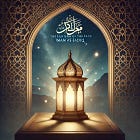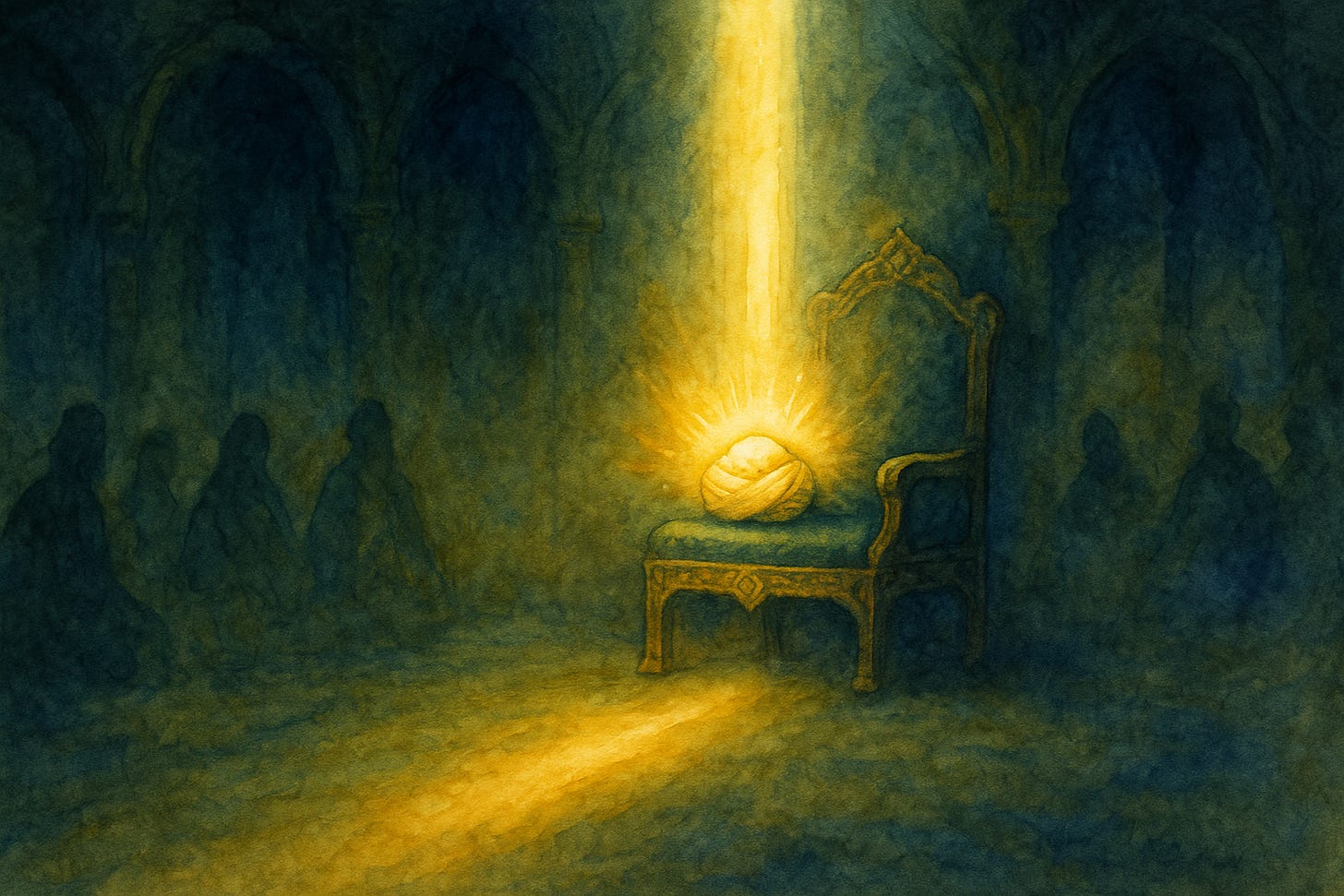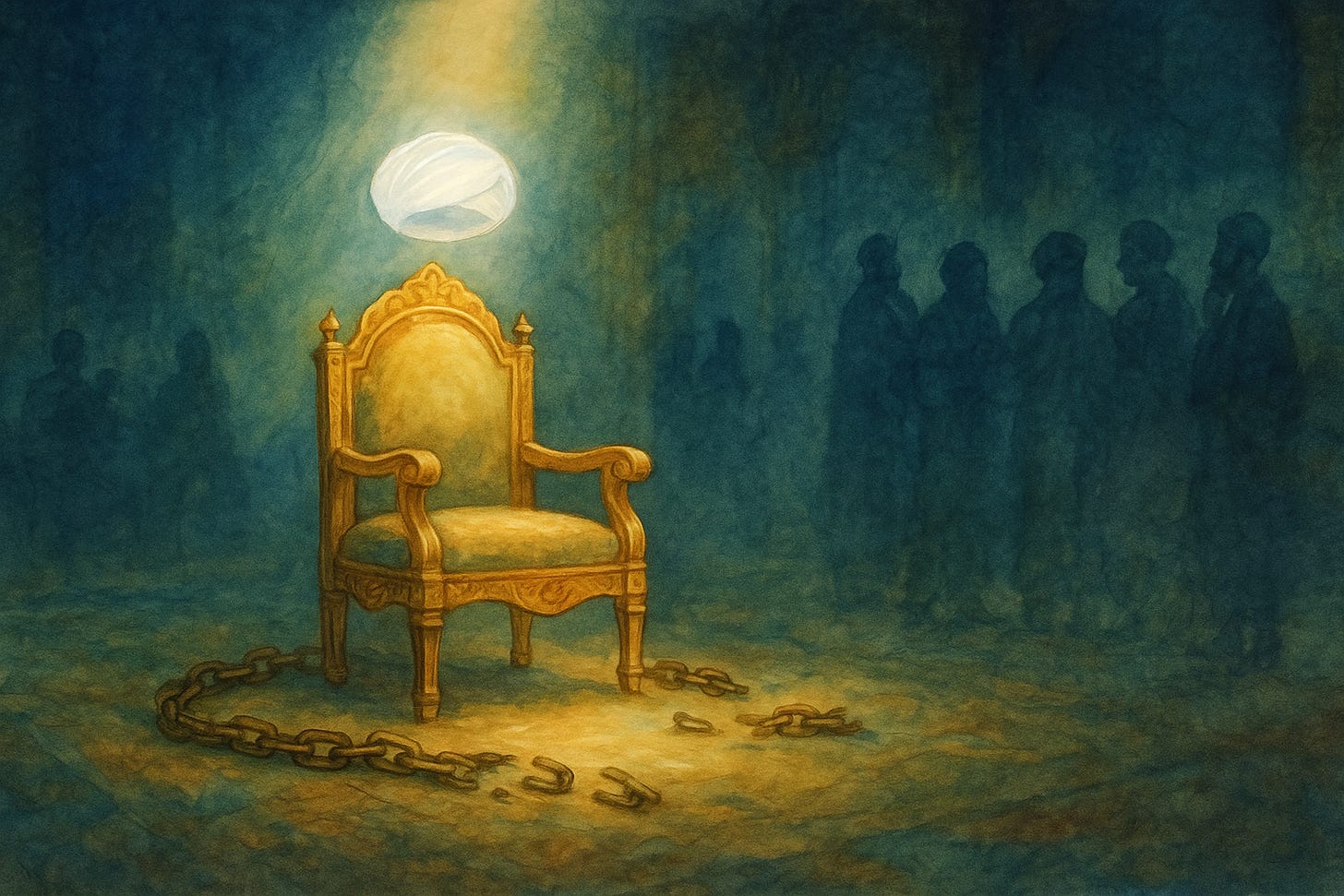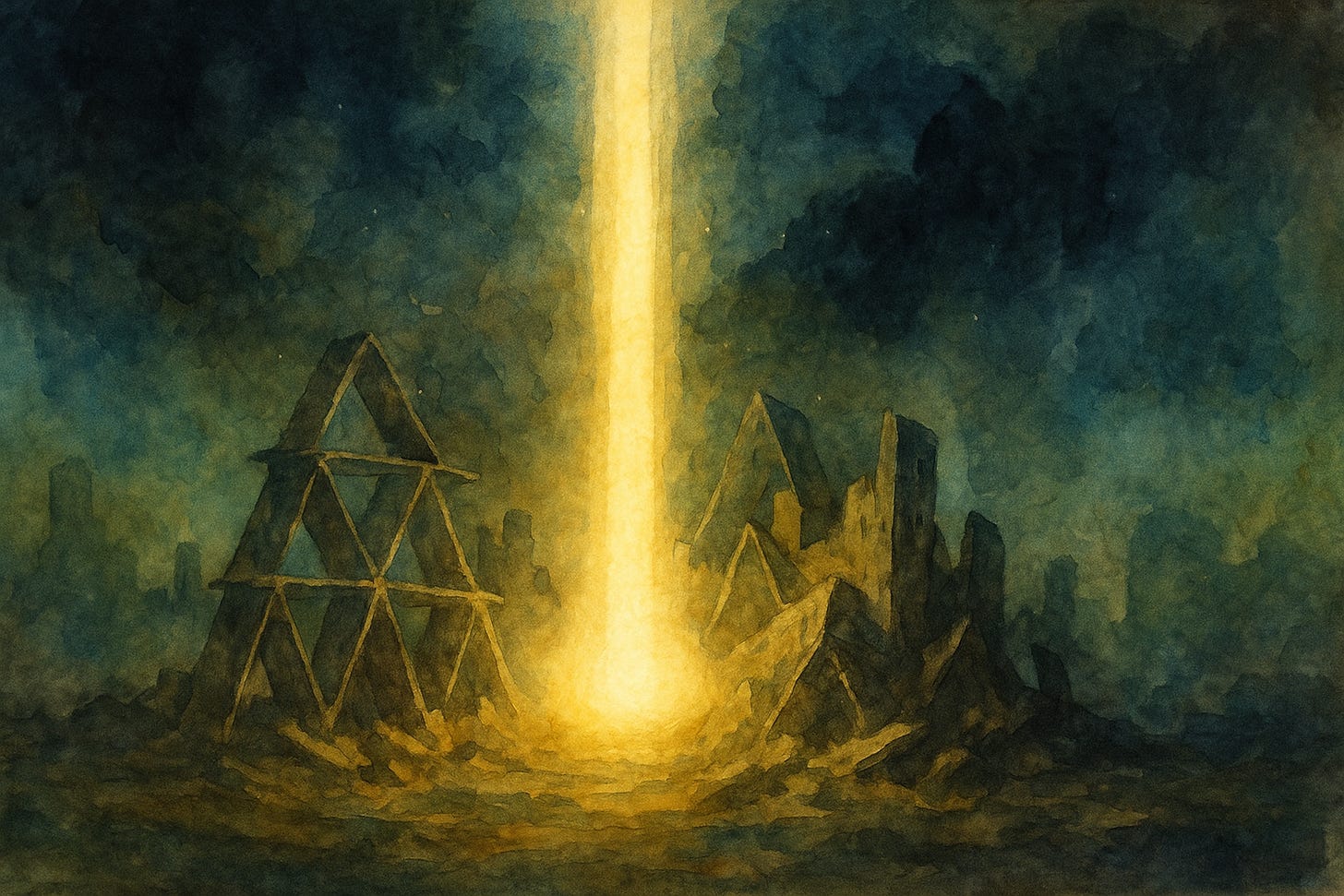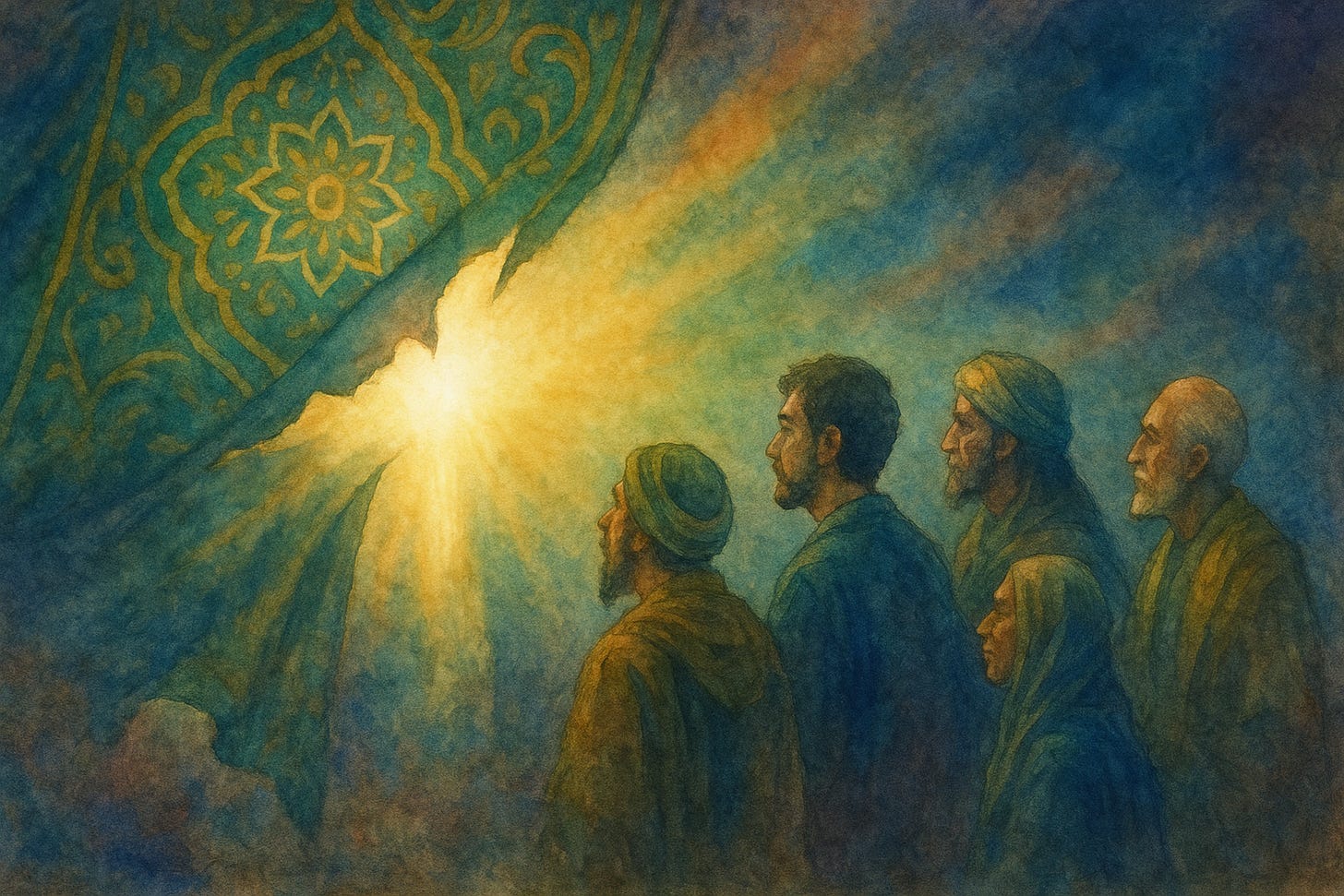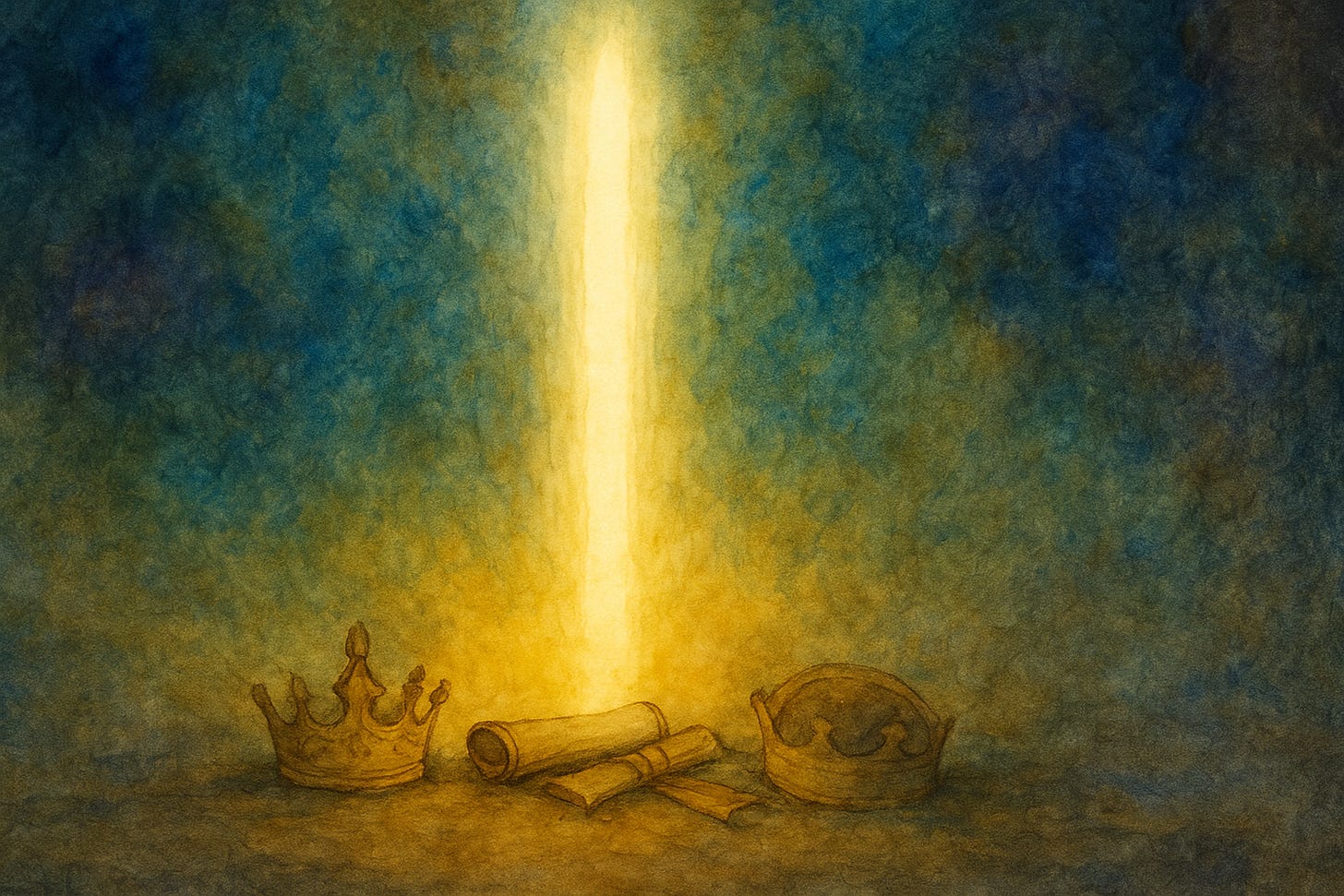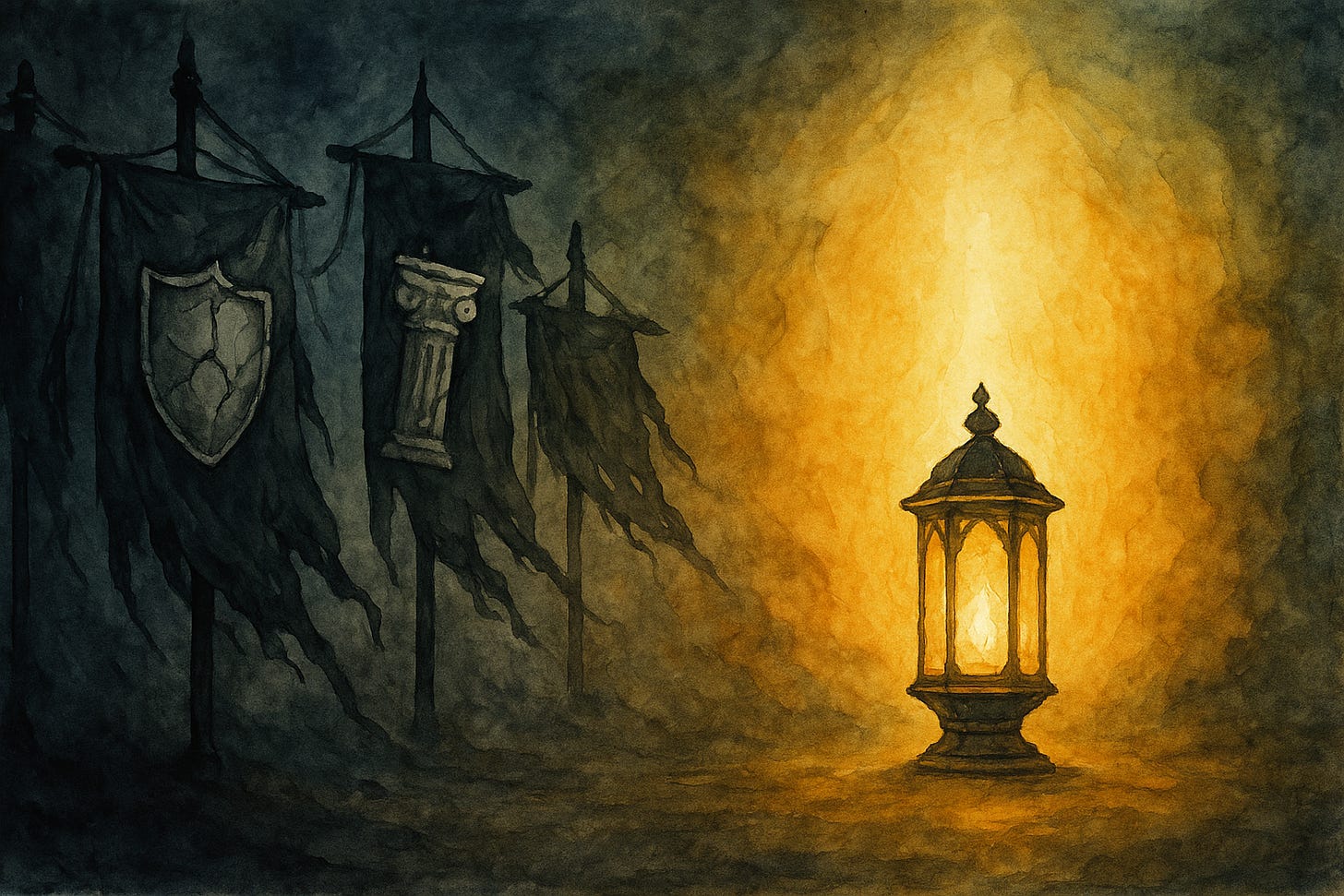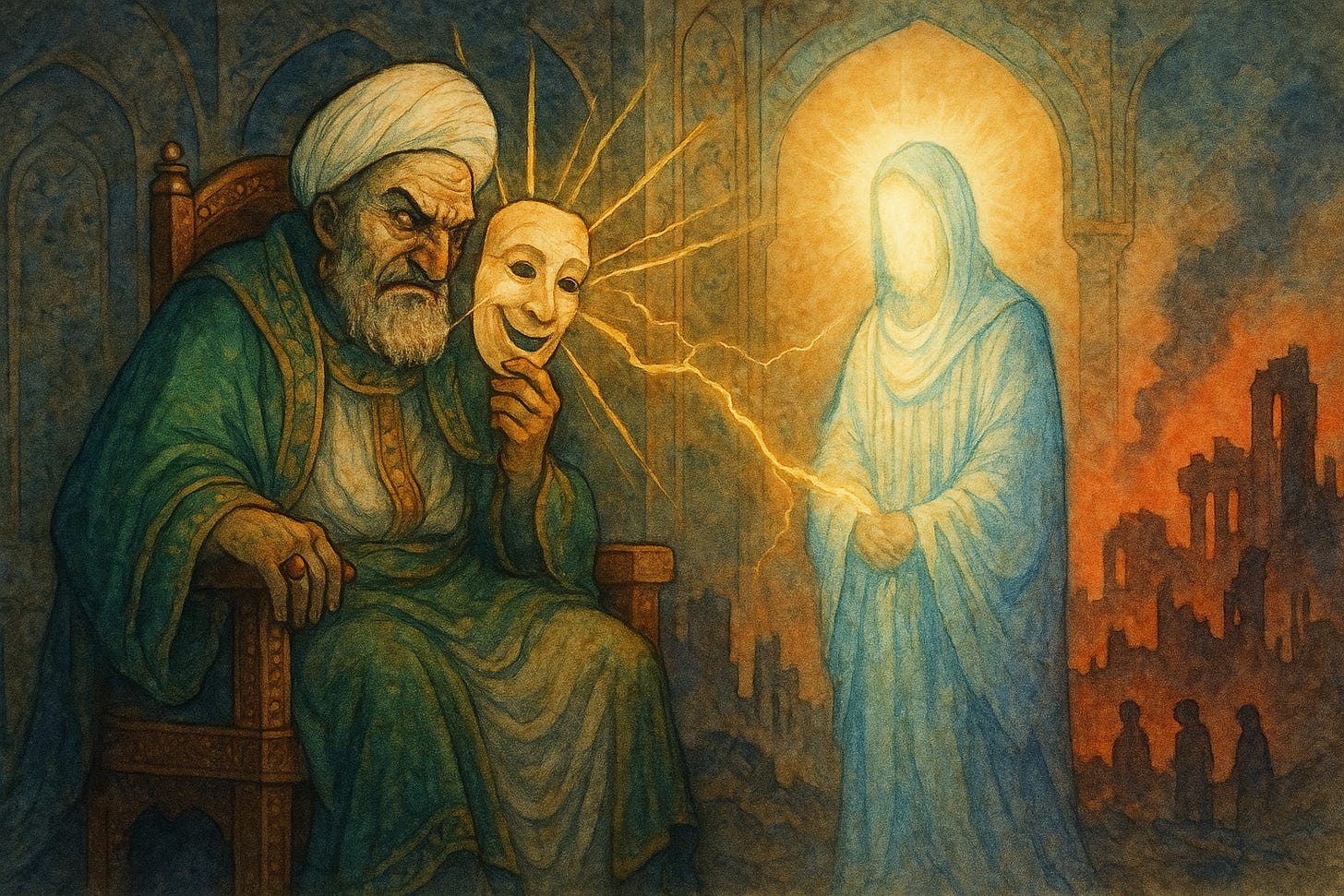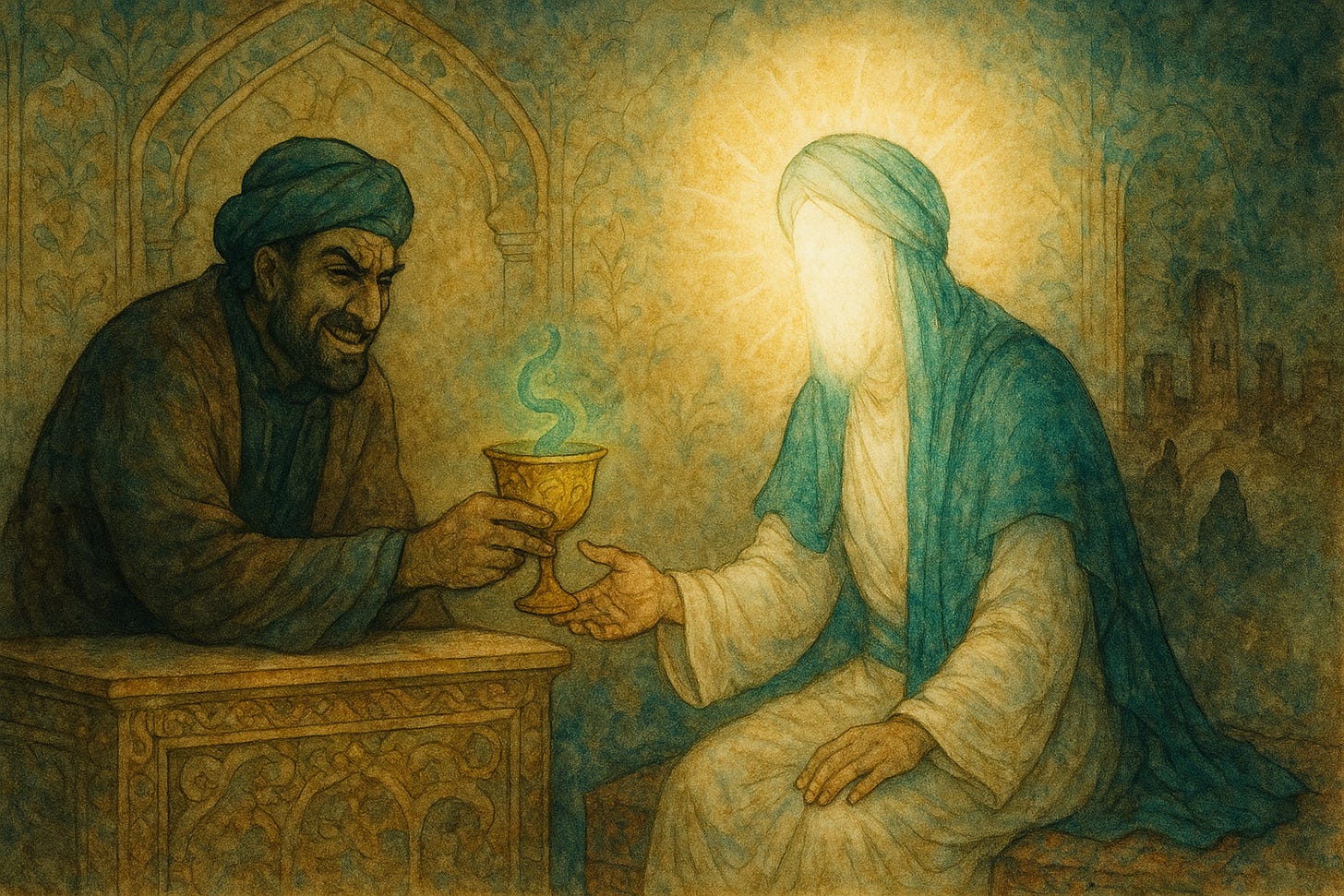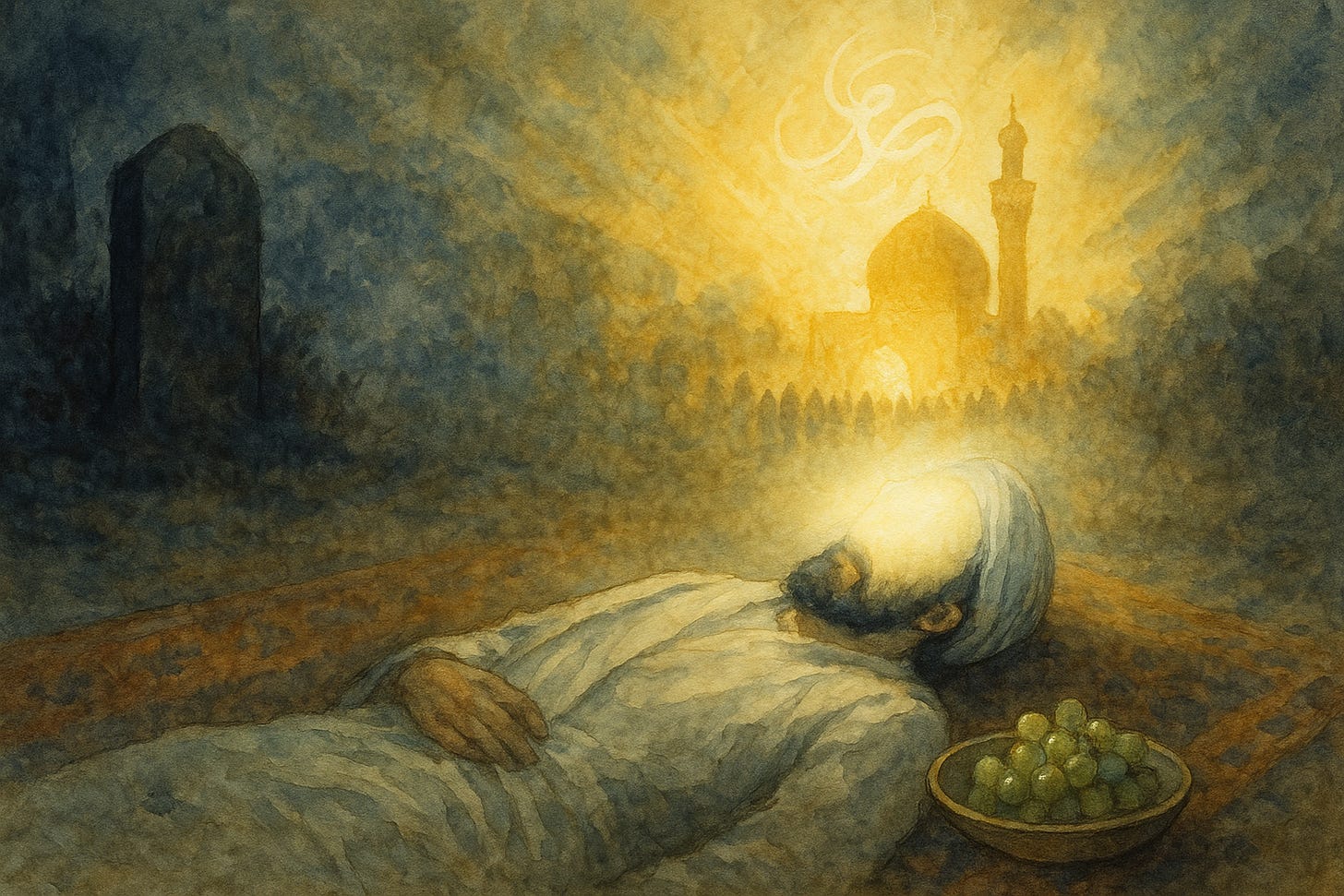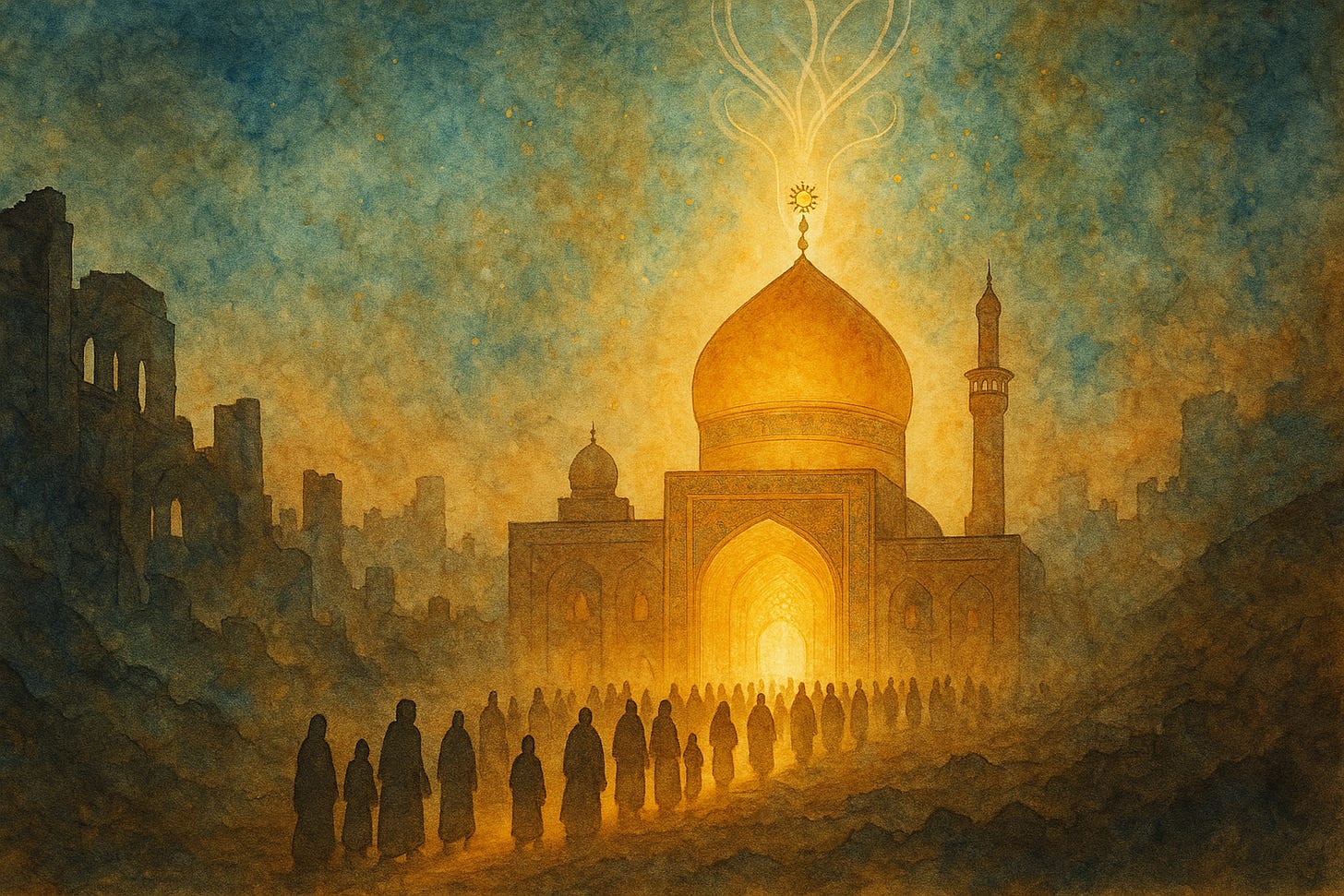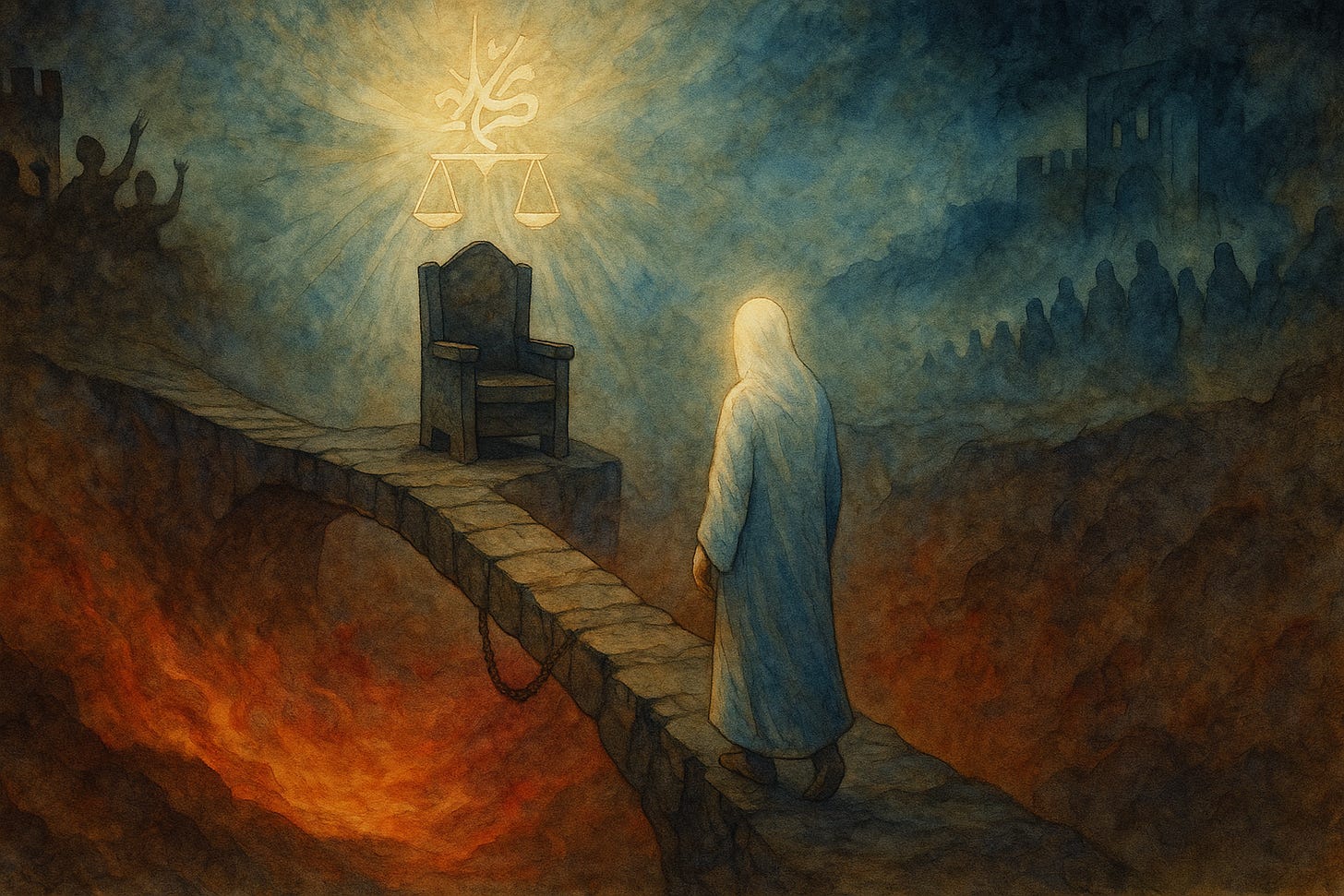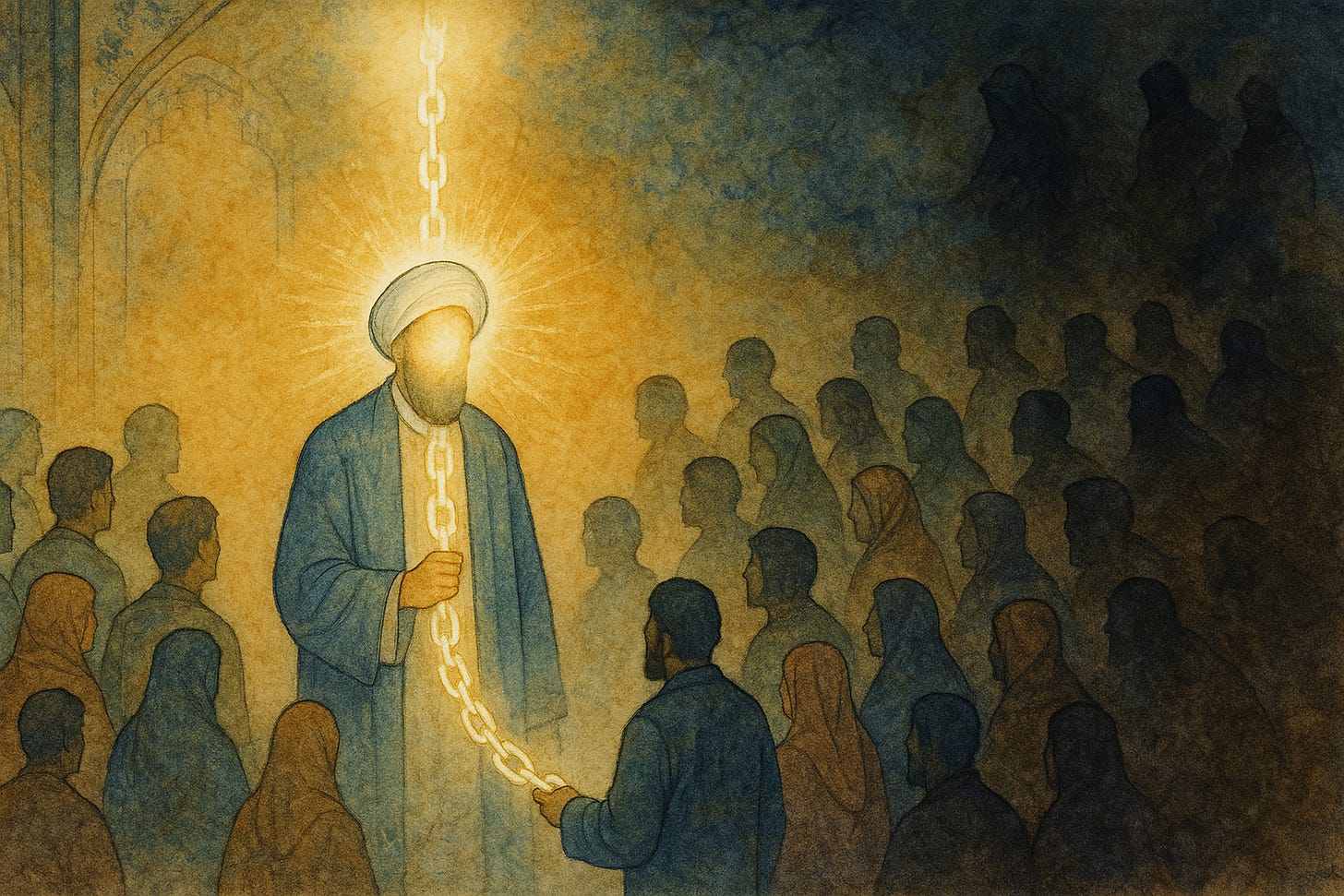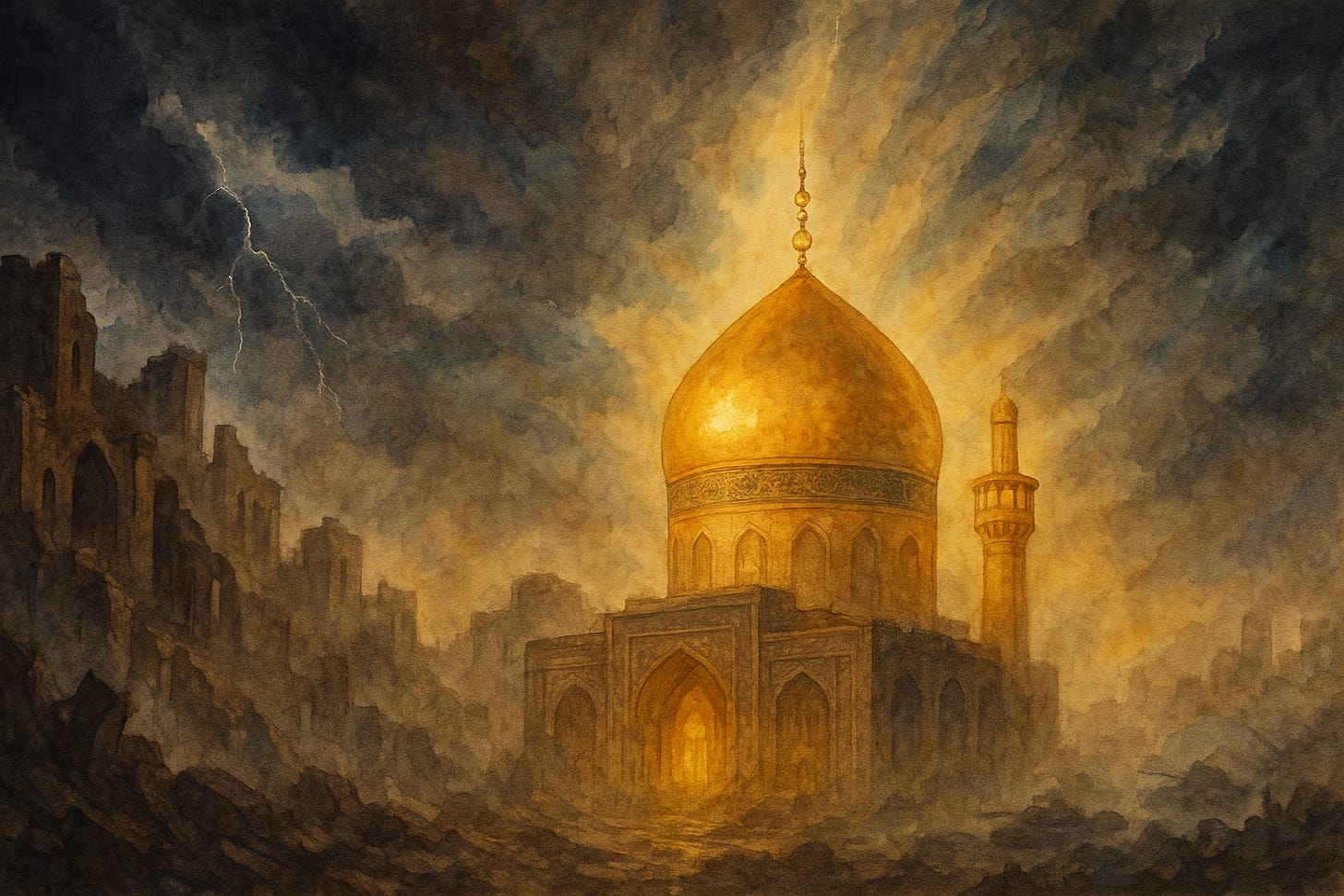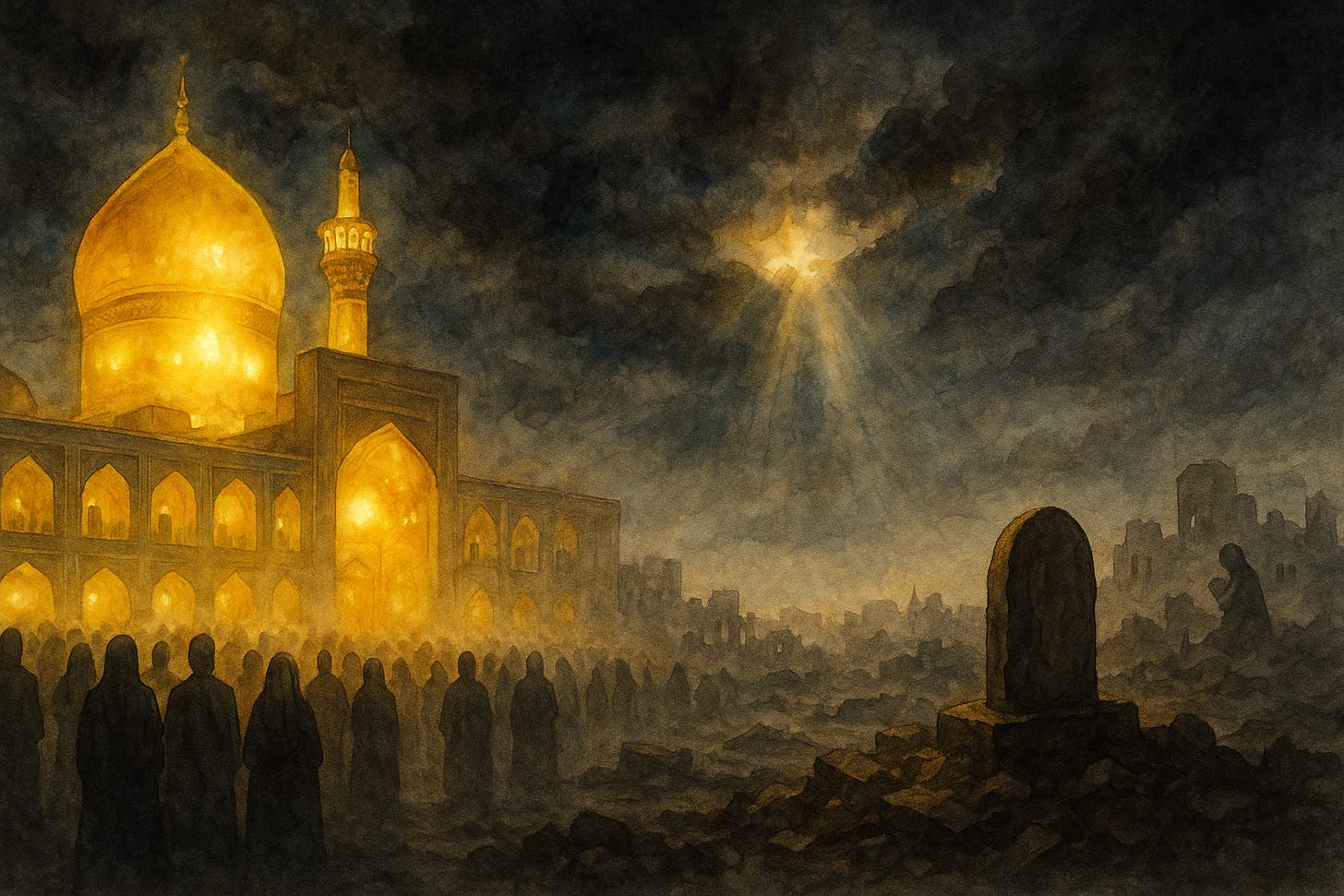[35] Imamah (Leadership) - Imam al-Ridha - Part 3: A Victory in Refusal
A series of discussions on the teachings of Imam Sadiq (sixth Imam of the Muslims), from the book Misbah ash-Sharia (The Lantern of the Path)
In His Name, the Most High
This is part thirty-five of our ongoing series of discussions on the book attributed to Imam al-Sadiq entitled Misbah ash-Sharia (The Lantern of the Path).
In our last session, we continued the new stage of these Wednesday Majalis, tracing the journey of Imam al-Ridha (peace be upon him) with careful attention to detail. Part thirty-four built upon the foundation laid in part thirty-three, following the Imam’s path of trial and witness step by step, in a way that allows the strategy of his Imamate to unfold gradually before us.
Today we arrive at the third of these four dedicated sessions on the life and mission of Imam al-Ridha. As before, we will continue with the three-point method: identifying three central themes, grounding them in the Quran, the traditions of the Ahl al-Bayt, and the insights of scholars, and concluding each with a call to clarify — lessons that translate into practice in our own lives.
The cumulative nature of this approach means each part is not a standalone piece but one strand of a larger, interwoven whole. For this reason, I encourage you to revisit the earlier parts of this series, especially sessions thirty-three and thirty-four, so that today’s discussion can be fully appreciated in its continuity.
With this framework in place, we now turn to part thirty-five, advancing further into the life of Imam al-Ridha, to uncover the light he cast in an age of deception and the guidance he left for us in ours.
The previous parts can be found here:
Video of the Majlis (Sermon/Lecture)
This is the video presentation of this write-up as a Majlis (part of the Truth Promoters Weekly Wednesday Majlis Program)
Audio of the Majlis (Sermon/Lecture)
This is the video presentation of this write-up as a Majlis (part of the Truth Promoters Weekly Wednesday Majlis Program)
Recap
From Containment to Amplification
Our previous session, the second of four dedicated to Imam al-Ridha (peace be upon him), explored how he masterfully transformed his forced journey from Madinah to Marv into a powerful public proclamation of truth. What was designed by the caliph Ma'mun as an act of isolation and containment became one of the most significant moments of da‘wah (calling to God) in the history of the Imams.
The session highlighted three pivotal stages of this journey:
Exile as a Travelling Pulpit The Imam began his journey by publicly framing it not as an honour, but as a funeral procession, making it clear to all that he was being marched towards his martyrdom. Despite Ma'mun’s carefully planned route to avoid Shia strongholds, the Imam turned every city and stop into a minbar (pulpit). He met with the people, answered their questions, and clarified the principles of Imamate, demonstrating that true sanctuary lies in God's covenant, not in a specific territory.
The Golden Chain of Nishapur The journey reached its zenith in the city of Nishapur, where thousands of scholars and residents gathered to hear from him. It was here he narrated the famous Hadeeth of the Golden Chain (Silsilat al-Dhahab). After reciting the divine promise that belief in God's oneness (La ilaha illa Allah) is a fortress of salvation, the Imam added the crucial condition: “...and I am one of its conditions.” With this single phrase, he inextricably linked Tawhid (monotheism) with Wilayah (loyalty to the divinely appointed Imam), cementing the core of Shia creed for generations to come.
Debates and Culture as Proclamation Upon arriving at Ma’mun’s court in Marv, the Imam was subjected to a series of debates with the leading scholars of other religions and sects. Ma’mun intended to overwhelm him, but the Imam turned these forums into a masterclass of tabyeen (clarification). Using wisdom and proofs from his opponents' own scriptures, he established the truth of his message. This intellectual jihad was amplified by poets like Da'bal al-Khuza'i, whose verses gave the voice of Shi'ism a powerful public and cultural resonance for the first time in decades.
In essence, the session demonstrated how Imam al-Ridha subverted his enemy's entire strategy, turning a journey of compulsion into a platform for da'wah, a moment of weakness into an unbreakable declaration of truth, and a gilded cage into a classroom for the entire Muslim world.
In His most beautiful Name, and with full trust in His support, we continue …
Imamah (Leadership) - Imam al-Ridha: A Victory in Refusal
The Caliph's Flaw: Containment Through Honour and Its Inevitable Failure
When Ma’mun placed the turban of succession upon the head of Imam al-Ridha (peace be upon him), he believed he had outwitted history. For decades, Abbasid caliphs had tried to silence the Imams with dungeons and swords. Ma’mun thought he had found a more subtle weapon: containment through honour. By elevating the Imam within the court, he hoped to neutralise him in the eyes of the people.
But the very design of this strategy doomed it to failure.
Acceptance Without Authority: How the Imam Stripped His Succession of Power
From the beginning, Imam al-Ridha made it clear that he was entering the position under compulsion, not desire. He declared:
إِنِّي دَخَلْتُ فِي وِلَايَةِ الْعَهْدِ دُخُولَ مَنِ اضْطُرَّ إِلَيْهِ
I entered into succession as one compelled into it.
— Al-Saduq, Uyun Akhbar al-Ridha, Volume 2, Page 149
He imposed conditions that stripped the succession of real power: no involvement in war or peace, no appointments or dismissals, no judgments or decrees. The throne gave him a title, but no authority — and he made sure all knew it.
Even Ma’mun’s closest officials admitted the humiliation. Fadl ibn Sahl, his vizier, remarked:
مَا رَأَيْتُ خِلَافَةً كَانَتْ أَضْيَعَ مِنْ هَذِهِ
I have never seen a caliphate so humiliated as this one.
— Al-Mufid, Al-Irshad, Volume 2, Page 260
What was meant to crown the Abbasids with legitimacy instead exposed their fragility.
The Steadfast Word: The Imam's Unwavering Stand Against Co-option
Time and again, Ma’mun tried to lure the Imam into taking decisions, into endorsing policies, into sharing responsibility for Abbasid actions. But the Imam refused, maintaining his distance.
The Quran promises such firmness to those anchored in faith:
يُثَبِّتُ اللَّهُ الَّذِينَ آمَنُوا بِالْقَوْلِ الثَّابِتِ فِي الْحَيَاةِ الدُّنْيَا وَفِي الْآخِرَةِ
God makes firm those who have faith with a steadfast word, in the life of this world and in the Hereafter.
— Quran, Surah Ibrahim (The Chapter of Abraham) #14, Verse 27
Imam al-Ridha’s steadfastness revealed that the Abbasid project had no real foundation. It was a house of cards, reliant on the Imam’s participation — and when he refused, the illusion collapsed.
The Unintended Awakening: Turning Celebration into Caution, and Propaganda into Truth
Rather than weakening Shi‘ism, the succession amplified it. Ordinary Muslims saw a stark contrast: the Abbasid caliph enthroned by force, and the descendant of the Prophet elevated by virtue. Loyalty began to shift. Shi‘ism, instead of being silenced, grew in strength.
Shaykh al-Saduq narrates that when people came to congratulate the Imam, he would tell them:
لَا تُغْتَرُّوا، فَإِنَّ هَذَا أَمْرٌ لَا يَتِمُّ
Do not be deceived — this matter will not last.
— Al-Saduq, Uyun Akhbar al-Ridha, Volume 2, Page 145
His words turned celebration into caution, directing the hearts of the people away from Abbasid propaganda and back to the reality of oppression.
The Power of Steadfastness: How Refusal Broke the Heart of the Scheme
Ayatullah Misbah Yazdi noted:
گاهی ایستادگی بر حق بزرگترین نقشههای سیاسی را در هم میشکند.
Sometimes steadfastness upon truth shatters the greatest political schemes.
— Ayatullah Misbah-Yazdi, Dars-hayi az Quran, Volume 3, Page 112
The Imam’s steadfastness — refusing to be drawn into Ma’mun’s game — broke the heart of the scheme.
Lessons for the Present: Why Legitimacy Cannot Be Borrowed from Oppression
The Abbasids sought to contain the Imam by giving him a seat at their table. Today, powers attempt the same: inviting Muslim leaders, scholars, or communities into their structures, offering them titles and positions to neutralise their resistance. But Imam al-Ridha teaches that legitimacy cannot be borrowed from the throne of oppression.
Containment fails when truth refuses to be co-opted.
Call to Clarify: Refusing to Lend Legitimacy to False Powers
Do not confuse titles with authority: the Imam’s legitimacy came from God, not from Abbasid decrees.
Recognise that refusal itself can be a form of resistance, stronger than participation.
Understand that when truth stands firm, even the most elaborate schemes of power collapse.
In the time of Imam al-Mahdi (may God hasten his reappearance), our duty is the same: refuse to lend legitimacy to false powers, however attractive their invitations may seem.
The Unflattering Mirror: How the Imam's Presence Exposed the Caliph's Hypocrisy
If Ma’mun had hoped to present himself as a pious and just ruler, the presence of Imam al-Ridha (peace be upon him) in his court only exposed the hypocrisy at the heart of the Abbasid project.
A Cloak of Piety, A Heart of Vice: How the Imam's Purity Exposed the Court's Corruption
Even while parading the Imam as his heir, Ma’mun appointed men of notorious corruption to the highest offices. Yahya ibn Aktham, infamous for indulgence and immorality, was raised as chief judge. Courtiers indulged in song, drink, and debauchery. The palace echoed with hypocrisy: on one side, the Abbasids sought to cloak themselves with the light of the Imam; on the other, they drowned themselves in vice.
This contradiction could not remain hidden. By merely existing alongside such corruption, the Imam became a mirror in which the Abbasids’ true face was revealed.
The Quran warns of rulers who mask corruption with piety:
وَمِنَ النَّاسِ مَن يُعْجِبُكَ قَوْلُهُ فِي الْحَيَاةِ الدُّنْيَا وَيُشْهِدُ اللَّهَ عَلَىٰ مَا فِي قَلْبِهِ وَهُوَ أَلَدُّ الْخِصَامِ
وَإِذَا تَوَلَّىٰ سَعَىٰ فِي الْأَرْضِ لِيُفْسِدَ فِيهَا وَيُهْلِكَ الْحَرْثَ وَالنَّسْلَ ۗ وَاللَّهُ لَا يُحِبُّ الْفَسَادَAmong the people is he whose speech about the life of this world impresses you, and he even calls God to witness what is in his heart, yet he is the fiercest of opponents.
And when he turns away, he strives to spread corruption in the land, destroying crops and offspring. God does not love corruption.— Quran, Surah al-Baqarah (the Chapter of the Cow) #2, Verses 204–205
Could this not describe Ma’mun, who spoke eloquently of justice, who paraded an Imam to prove his sincerity, yet whose policies were soaked in corruption?
The Boomerang Effect: When a Plan to Diminish the Imam Legitimised Him Instead
Ma’mun arranged public debates, hoping to diminish the Imam. But every debate backfired. The Imam’s calm reasoning exposed the ignorance of scholars, priests, and courtiers. Instead of legitimising Ma’mun’s court, the sessions legitimised the Imam and exposed the shallowness of Abbasid piety.
The Prophet Muhammad (peace and blessings be upon him and his family) had warned:
سَيَكُونُ بَعْدِي أُمَرَاءُ يَكْذِبُونَ وَيَظْلِمُونَ، فَمَنْ صَدَّقَهُمْ بِكَذِبِهِمْ وَأَعَانَهُمْ عَلَىٰ ظُلْمِهِمْ فَلَيْسَ مِنِّي وَلَسْتُ مِنْهُ
There will be rulers after me who lie and oppress. Whoever affirms their lies and aids them in their oppression is not from me, and I am not from him.
— Al-Kulayni, Al-Kafi, Volume 5, Page 108, Hadeeth 6
— Al-Majlis, Bihar al-Anwar, Volume 72, Page 353
The Imam, by his refusal to affirm and his exposure of falsehood, fulfilled this Prophetic command.
The Falling Mask: How Reality Exposes a Ruler's False Piety
Imam Khomeini spoke of this cycle of hypocrisy:
حُكّامِ جائر هميشه سعى مىكنند با پوشش دين مردم را بفريبند، ولى دين حقيقى رسوايى آنها را آشكار مىكند.
The unjust rulers always attempt to conceal themselves with religion in order to deceive the people, but true religion unmasks their disgrace.
— Imam Khomeini, Sahifeh-ye Imam, Volume 13, Page 412
And Imam Khamenei reminded us:
تظاهر دشمنان به دين پايدار نيست؛ خيلی زود واقعيت آنها را رسوا مىكند و نقابشان مىافتد.
The enemies’ display of religion does not last; soon reality exposes them and their mask falls.
— Imam Khamenei, Speech in Tehran, August 27, 1997 (Shahrivar 5, 1375 SH)
This is precisely what happened with Ma’mun: the mask fell, and his hypocrisy was revealed.
Lessons for the Present: Exposing Hypocrisy by Contrast with the Truth
In every age, rulers claim to be moral, religious, or just, while funding injustice and oppression. Today, regimes cloak genocide with the language of “security,” cloak tyranny with the rhetoric of “progress,” cloak immorality with the banners of “freedom.” But Imam al-Ridha shows us the path: remain steadfast, refuse to affirm their lies, and let their hypocrisy be exposed by contrast with the truth.
Call to Clarify: Refusing to Be Deceived by Masks of Piety
Recognise that hypocrisy is most dangerous when cloaked in piety.
Refuse to lend legitimacy to rulers who use religion to cover corruption.
Expose falsehood by contrast — the Imam’s presence itself revealed the Abbasids’ decay.
In our time, clarify that no claim of “justice” or “freedom” can hide the crimes of tyranny.
Await Imam al-Mahdi by refusing to be deceived by masks of piety.
The Final, Failed Gambit: When Co-option Fails, Poison Follows
Ma’mun had wagered that naming Imam al-Ridha (peace be upon him) as heir would end the threat of Shi‘ism. Instead, it amplified it. The Imam’s popularity grew, his debates elevated him above the court, his refusal to compromise revealed Abbasid weakness. What was meant to contain him only magnified his legitimacy.
When the mask of legitimacy cracked, Ma’mun was left with the same weapon as his predecessors: poison.
A Light Perfected: The Martyrdom of the Imam and the Failure of the Oppressors
Historical sources record that Ma’mun invited the Imam to eat grapes laced with poison. Shortly after, the Imam fell ill and passed away in Tus in 203 AH. Aba al-Salt narrates:
دَخَلْتُ عَلَى الرِّضَا (ع) فَقَالَ لِي: قَدْ فُعِلَ بِي فِعْلَةٌ وَجَعَلَ يَقُولُ: مَا مَرَّ بِي مِثْلُ مَا أَنَا فِيهِ قَطُّ
“I entered upon Imam al-Ridha, and he said to me: A deed has been done to me… and he kept repeating: I have never experienced anything like this before.”
— Al-Saduq, Uyun Akhbar al-Ridha, Volume 2, Page 259
Thus, the Imam joined the line of martyrs of Ahl al-Bayt — poisoned not by enemies of Islam, but by those who claimed to rule in its name.
He was buried in Tus beside Harun al-Rashid, the Abbasid caliph who had poisoned his father, Imam Musa al-Kadhim. The oppressor and the oppressed share a graveyard — yet it is the Imam’s shrine that became a centre of life and pilgrimage, while Harun’s memory is buried in disgrace.
The Quran summarises this irony:
يُرِيدُونَ لِيُطْفِئُوا نُورَ اللَّهِ بِأَفْوَاهِهِمْ وَاللَّهُ مُتِمُّ نُورِهِ وَلَوْ كَرِهَ الْكَافِرُونَ
“They desire to extinguish the light of God with their mouths, but God will perfect His light, though the disbelievers detest it.”
— Quran, Surah al-Saff (The Chapter of the Ranks) #61, Verse 8
An Admission of Defeat: Why the Assassination Immortalised, Not Eradicated, Shi‘ism
In killing the Imam, Ma’mun admitted defeat. His elaborate scheme — years of political manoeuvring, propaganda, and manipulation — ended in the crudest of methods: assassination. Instead of eradicating Shi‘ism, he immortalised it. Imam al-Ridha’s shrine in Mashhad became one of the greatest centres of pilgrimage in the Muslim world, while the Abbasids slid into decline.
The Quran gives us another lens through Prophet Yusuf:
وَقَالَ الْمَلِكُ ائْتُونِي بِهِ أَسْتَخْلِصْهُ لِنَفْسِي ۖ فَلَمَّا كَلَّمَهُ قَالَ إِنَّكَ الْيَوْمَ لَدَيْنَا مَكِينٌ أَمِينٌ
قَالَ اجْعَلْنِي عَلَىٰ خَزَائِنِ الْأَرْضِ ۖ إِنِّي حَفِيظٌ عَلِيمٌThe king said, ‘Bring him to me, I will make him my favourite.’ Then, when he had spoken with him, he said, ‘Indeed today [onwards] you will be honoured and trustworthy with us.’
He (Yusuf) said, ‘Put me in charge of the country’s granaries. I am indeed fastidious [and]well-informed.’— Quran, Surah Yusuf (the Chapter of (Prophet) Joseph) #12, Verses 54–56
Yusuf entered government by divine command, bringing justice through participation. Imam al-Ridha refused government, bringing justice through non-cooperation and martyrdom. Both are strands of divine wisdom: sometimes reform comes through entry, sometimes through refusal.
The Imam's path of refusal sets a profound standard for us. It forces us to step back from this specific history and ask the fundamental question that lies at the heart of our jurisprudence—a question our greatest scholars have sought to answer.
A Burden, Not an Honour: The Juristic Principle of Political Office
In the eyes of God, what is the nature of power and political office?
Is it a prize to be sought, a status to be celebrated, an honour to be displayed?
Or is it something far more sobering, far more demanding?
Islamic jurisprudence, particularly within the Shia tradition, provides a clear and profound answer. It teaches us that leadership is not a privilege but a profound and perilous responsibility.
The great scholar Ayatullah Sayyed Muhammad Hussein Fadhlullah (may God rest his pure soul) encapsulated this principle beautifully when he stated that political office in Islam is fundamentally taklif (responsibility), not tashrif (honour):
المنصب في الإسلام تكليف وليس تشريفًا
Political office in Islam is a burden of responsibility (taklif), not an honour (tashrif)
— Ayatullah Fadhlullah, Al-Islam wa Mantiq al-Quwwa (Islam and the Logic of Power), Page 215
To understand this is to understand the very essence of service in our faith.
Tashrif denotes honour and nobility, a worldly prize. But taklif comes from a root meaning to impose a heavy burden or a difficult task.
It is the same word used for the obligations that God places upon us, such as prayer and fasting.
Therefore, to hold office is to be divinely tasked with an immense weight: the weight of justice, the protection of the vulnerable, and accountability before God for every single decision.
This understanding becomes critically important when a believer must consider serving under an unjust or oppressive authority (al-hukuma al-ja’ira).
The default, foundational rule is unequivocal: cooperation with oppressors is forbidden (haraam).
It is a poison for the soul and a betrayal of the community.
However, our faith is one of mercy and realism. It recognises that situations may arise where a greater harm can only be averted through limited engagement.
This is the domain of dharurah, or overriding necessity. As guided by the rulings of Ayatullah Sistani, this exception is narrowly defined:
لا تجوز الإعانة للظالمين على ظلمهم، بل مطلق التعاون معهم ـــ إلا في حال الاضطرار، وبمقدار ما تقتضيه الضرورة.
It is not permissible to aid the oppressors in their oppression; indeed any form of cooperation with them is prohibited — except in a state of necessity, and then only to the extent that necessity requires.
— Ayatullah Sistani, Minhaj al-Salihin (the Path of the Righteous), Volume 1, Pages 17-18, Mas’ala (Ruling) 14-15
This is not an open door for ambition; it is an emergency exit to be used with extreme caution and reverential fear of God (taqwa).
The jurists have placed a firm lock on this door, which can only be opened by true necessity.
This is governed by another core legal maxim, emphasised in the works of scholars like the late Ayatullah al-Khui (may God rest his pure soul):
الضرورات تقدر بقدرها؛ فلا يجوز التعدي عمّا تقتضيه حالة الاضطرار.
Necessities are measured according to their degree; it is not permissible to exceed what the state of necessity requires.
— Ayatullah Khui, Al-Masa’il al-Muntakhabah (Selected Rulings), Page 25, Mas’ala 60
— The principle, 'Necessities are measured strictly by their limits' (al-dharurat tuqaddar bi-qadariha), constitutes a foundational legal maxim (qa’idah fiqhiyyah) universally applied in both Sunni and Shia schools of Islamic law, rooted in the Quranic injunctions regarding situations of compulsion
What does this mean? It means that if one must engage with an unjust system to, for example, protect the lives and property of the faithful, one's involvement can extend only to the absolute minimum required to achieve that specific good.
Any step beyond that line—for personal gain, for status, for wealth—is a step back into the forbidden.
Therefore, the believer who contemplates this path must look deep into their own heart and intentions.
Are they entering this arena to serve God and His creation, or to serve themselves?
For the path of public office is not a red carpet leading to glory, but a tightrope stretched over a great fire, where one is accountable for every step, every word, and every intention. It is, and must always be seen as, a burden, not an honour.
The Chain of Authority: From the Imam to the Wali al-Faqih
Imam al-Ridha’s refusal to endorse Abbasid rule sets the standard: leadership positions are not badges of prestige but weights of accountability.
If an Imam declines them under duress, then scholars and believers must be even more cautious about accepting roles that risk legitimising oppression.
And when legitimate authority — the Imam, or in our time the wali al-faqih and maraji — sets boundaries, the community must adhere. History shows the cost of disobedience: in one community a few years ago, resistance to the decision of the wali’s representative led to fractures so deep that even years later, division persists.
When the principle of obedience was abandoned, cohesion collapsed, and enemies exploited the rift.
Lessons for the Present: Survival is Not in the Throne, But in the Ark
Every tyrant thinks their schemes will endure. Every oppressor believes they can bury truth. But Imam al-Ridha’s martyrdom proves that the light of God cannot be extinguished. From Karbala to Tus, from Baghdad to Gaza, the oppressor always falls, and the oppressed always rises.
The Prophet Muhammad (peace and blessings be upon him and his family) said:
مَثَلُ أَهْلِ بَيْتِي فِيكُمْ كَمَثَلِ سَفِينَةِ نُوحٍ مَنْ رَكِبَهَا نَجَا وَمَنْ تَخَلَّفَ عَنْهَا غَرِقَ
“The example of my Ahl al-Bayt among you is like the Ark of Noah: whoever boards it is saved, and whoever turns away from it is drowned.”
— Al-Kulayni, al-Kafi, Volume 2, Page 502
— Al-Saduq, Uyun Akhbar al-Ridha, Volume 2, Page 56
— Al-Majlisi, Bihar al-Anwar, Volume 23, Page 105 and Volume 27, Page 113
— Al-Hakim, al-Mustadrak, Volume 2, Page 343
— Al-Suyuti, Al-Durr al-Manthur, Volume 2, Page 385
— Al-Tabarani, Al-Mu’jam al-Kabir, Volume 3, Page 37
The Imam’s martyrdom reaffirmed this truth: survival is not in the throne, but in the ark of wilayah.
Call to Clarify: Holding Fast to the Ark in the Fiercest of Storms
Recognise that tyranny eventually collapses into its own hypocrisy and violence.
See in Imam al-Ridha’s martyrdom the proof that truth cannot be extinguished by poison or prison.
Understand that shrines of the oppressed outlive the palaces of the oppressors.
In our age, do not despair at the genocide in Gaza or the corruption of rulers — history shows the oppressor always fails, and the light of God always prevails.
Prepare for Imam al-Mahdi by holding fast to the ark of Ahl al-Bayt, never abandoning loyalty no matter how fierce the storm.
Conclusion
Ma’mun thought he had found the ultimate solution to the “problem” of the Ahl al-Bayt. He imagined that by placing Imam al-Ridha (peace be upon him) beside him, he could contain Shi‘ism, legitimise Abbasid power, and extinguish the cause of wilayah.
But the scheme collapsed under its own weight:
We saw the failure of containment. The Imam’s refusal to participate stripped the succession of legitimacy and revealed the Abbasids’ weakness.
We then saw the exposure of hypocrisy. The Abbasid mask of piety fell away in the face of the Imam’s presence, as corruption and falsehood were revealed.
And furthermore, we saw how Ma’mun, unable to achieve his goals, turned to poison — the final admission of defeat. The martyrdom of the Imam only amplified Shi‘ism and immortalised his name.
The Abbasids’ attempt to silence the light became the cause of its radiance. Imam al-Ridha’s shrine in Mashhad stands as a living testament that thrones rot, but wilayah endures.
For us today, the lesson is urgent: powers will always seek to contain, co-opt, and corrupt the truth. But steadfastness, refusal to affirm falsehood, and loyalty to the Imam of the age expose tyranny and ensure that truth survives.
This is the path of preparation for Imam al-Mahdi (may God hasten his reappearance). The Abbasids could not extinguish the light of Imam al-Ridha, and today’s tyrants will not extinguish his light either.
In the next session — session 36 — we will reflect on the deeper essence of Imamate as a divine reality beyond palaces, titles, and politics — and what it means for us in the age of occultation.
A Supplication-Eulogy for Imam al-Ridha - The Light Beside the Tyrant’s Grave
In the Name of God, the All-Merciful, the All-Compassionate.
O God, send Your blessings upon Muhammad
and the family of Muhammad —
the oppressed who outshine oppressors,
the light that no poison can extinguish,
the ark that no storm can sink.Peace be upon you, O Ali ibn Musa al-Ridha,
O son of the chained one,
O heir of the patient ones,
O martyr of Tus.They forced succession upon you,
but you turned it into refusal.
They masked themselves with your name,
but you exposed their corruption.
They poisoned you with grapes,
but you became eternal in the hearts of believers.Beside Harun you were buried —
the tyrant and the Imam, the palace and the pulpit,
the oppressor who killed, and the oppressed who lives on.
Today your shrine is filled with pilgrims,
while his grave is covered in shame.O God, in this age of hypocrisy,
when rulers still cloak tyranny with words of justice,
grant us the basirah — the insight — to see through their masks.
Do not let us be deceived by their lies,
nor silenced by their threats.O Imam al-Mahdi, hidden son of Fatima,
our grief for Gaza calls to you.
Children buried under rubble,
mothers weeping in empty homes,
innocents starved and slaughtered —
this is the poison of our age,
the grapes of Tus repeated in Palestine.O Awaited One, we recite with the words of Ziyarat Ashura:
“O God, curse the first oppressor who wronged the right of Muhammad and the family of Muhammad.”
And we weep with Dua al-Nudbah:
“Where is the avenger of the blood spilled in Karbala?”
O God, hasten his reappearance.
Let the shrines of the oppressed be our beacons,
let the graves of tyrants be our warnings,
and let us live as clarifiers of truth until the day when the Mahdi rises,
and all thrones of falsehood crumble into dust.Amen, O Lord Sustainer of the Universes,
Amen, O Most Merciful of the Merciful
And from Him alone is all ability and He has authority over all things



